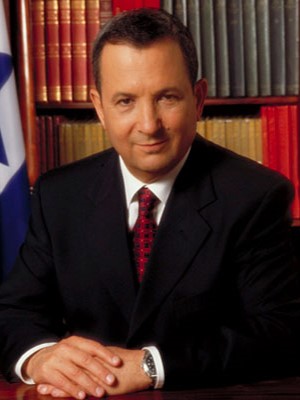Ehud Barak
 Ehud Barak ( ; born Ehud Brog; 12 February 1942) is an Israeli former general and politician who served as the tenth prime minister from 1999 to 2001. He was leader of the Labor Party between 1997 and 2001 and between 2007 and 2011.
Ehud Barak ( ; born Ehud Brog; 12 February 1942) is an Israeli former general and politician who served as the tenth prime minister from 1999 to 2001. He was leader of the Labor Party between 1997 and 2001 and between 2007 and 2011.Born on a kibbutz, Barak is the eldest of four sons; his grandparents were murdered in the Holocaust. He graduated in physics and mathematics from the Hebrew University of Jerusalem and later obtained a master's in engineering-economic systems from Stanford University.
Barak's military career in the Israel Defense Forces (IDF) began in 1959, spanning 35 years and culminating in his appointment as Chief of the General Staff in 1991, serving until 1995. His military tenure is noted for his leadership in several operations, including "Operation Isotope" in 1972, the covert 1973 Israeli raid in Lebanon, and the 1976 Entebbe raid. A lieutenant general, Barak shares with two others the honor of being the most highly decorated soldier in Israel's history.
In politics, his career began with his appointment as interior minister in 1995 under Prime Minister Yitzhak Rabin. Following Rabin's assassination, he served as Minister of Foreign Affairs in Shimon Peres' government. Barak was elected to the Knesset on the Labor Party list in 1996 and subsequently became party leader. Barak served as Israel's last left-wing Prime Minister from 1999 to 2001. His tenure was marked by significant events, including the decision to form a coalition with the Orthodox party Shas, the withdrawal of Israeli forces from Southern Lebanon in 2000, and participation in the 2000 Camp David Summit aimed at resolving the Israeli–Palestinian conflict. Barak's government faced challenges, notably the protests in October 2000.
After defeat in the 2001 Israeli prime ministerial election, he left politics and engaged in international business and advisory roles. He made a political comeback in 2005, attempting to regain leadership in the Labor Party, and later served as defense minister − where he led Operation Cast Lead in 2008–09 − and deputy prime minister under Ehud Olmert and then in Benjamin Netanyahu's second government between 2007 and 2013. His decision to form the Independence party in 2011 marked a shift in his politics, influencing the dynamics within the Netanyahu government. Despite retiring from politics in 2012, he attempted another comeback, running in the September 2019 Israeli legislative election as the leader of Israel Democratic Party − a new party he formed. His party merged with others to form an alliance called the Democratic Union, but it did not win enough seats for him to become a member of the Knesset. Outside of his political and military career, Barak has accumulated wealth through business endeavors and investments; his net worth is estimated to be $10–15 million. Provided by Wikipedia
